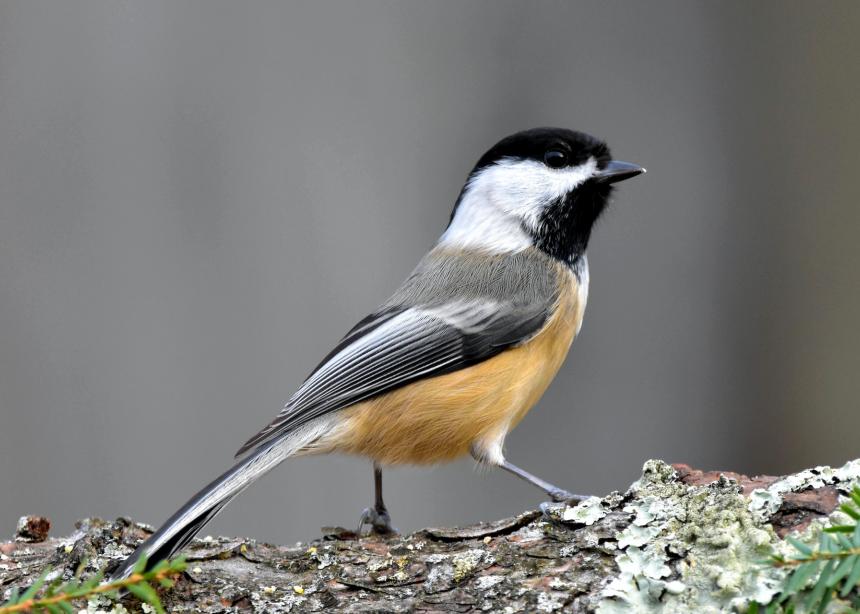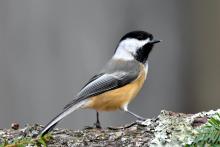Normally I hearken closely to the words of Jesus. But although he advises that we consider the sparrows of the field, I’d rather pay attention to chickadees.
Being commonplace seems to be no barrier to the joy chickadees bring to many. Chickadees live across the entirety of the southern half of Canada and all the rest of the North American continent, even through the Canadian winters. Five of the seven species breed in Canada, but the black-capped chickadee is the most well known. They even reside in the human-dominated, urban environs in which most of us humans also live. Nevertheless, since none even pass through Palestine, Jesus was probably right to pick a bird family that was more globally distributed.
Chickadees are also special in that other similarly small songbirds gather with them. The chickadee has an alarm call alerting all to the presence of predators. Every birder knows how to make the “pishing” that attracts these mixed species flocks. For other birds, the value of hanging around chickadees is that, if one can see the danger, the danger is lessened. The flock is safer for everyone.
Lessons from these facts could be applied to us: Flock together and help each other out. Pay attention to the gifts of others who are not quite like yourself. The common is still special.
The Bible is full of such lessons-by-analogy. But I want to take it farther. Chickadees are not mere object lessons. I see them as sacraments.
In her poetry collection, What the Chickadee Knows, Margaret Noodin—who writes in Anishinaabemowin and English—observes, “The marsh chickadee is there in the white pine / calling out… / it’s a ceremony, a way to be alive.”
In other words, the chickadee and its calls are directly honouring the Creator. In Indigenous worldviews, spiritual and physical are intimately connected. More than overlapping, the spiritual world is the physical world, and vice versa. Ceremony is a way of re-enacting this relationship. For Noodin, the chickadee is ceremony. The closest we can come in Christian thinking is the concept of sacramentality.
I reckon that most Mennonites think of “sacraments” as signs or symbols pointing towards God. Other Christian traditions, such as Catholicism and Eastern Orthodoxy, believe that, in the sacraments, God is really present, albeit in some mysterious way.
“Sacramentality” is wider than specific church practices. It means a worldview— nay, a way of being—in which God is “really present” in the world and not just spoken about. In a chapter on sacraments in the book Sharing Peace: Mennonites and Catholics in Conversation, Anabaptist systematic theologian Thomas Finger brings the two Christian traditions together. Theologies of “sacraments” are based on “the mysterious manner in which God has used the agents of his creation for his self-communication,” he writes. Reality itself is sacramental, he adds.
Finger continues to explain: Because God is immanent in all creation (The Spirit hovers over the waters, in Christ all things hold together), all Christians have this sense of sacramentality, regardless of whether we name two, five or seven official “sacraments.” God’s deliberate and ongoing “communication of divine invisible, spiritual grace through creaturely, visible, material channels” is the active, ongoing action.
Sacramentality is the lived reality that the physical and spiritual are inseparable. Thus, the chickadee is a sacrament. It is ceremony. Ponder that the next time one lands on your bird feeder. The divine is communicating with you.
Randolph Haluza-DeLay is a former outdoor educator who wonders what referring to “the chickadee people” would do to our ways of relating to God.
Read more Mind and Soul columns:
Beyond free speech
Say no to moralistic therapeutic deism
Christmas delight?
Writing for the foyer
What is your theory of social change?





Comments
Randy, I like how you see God and his works in some of the simplest things in life, like the chickadee.
Yes. I have felt accompanied - and been flushed with joy - by my chickadee neighbors in the city block (and up and down the street) where I live.
Add new comment
Canadian Mennonite invites comments and encourages constructive discussion about our content. Actual full names (first and last) are required. Comments are moderated and may be edited. They will not appear online until approved and will be posted during business hours. Some comments may be reproduced in print.